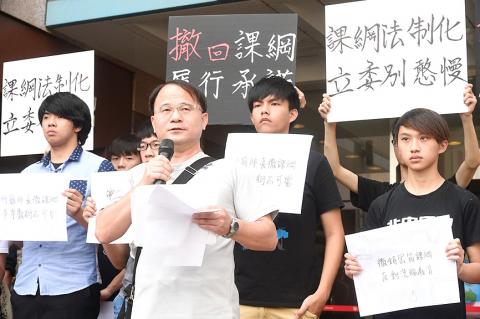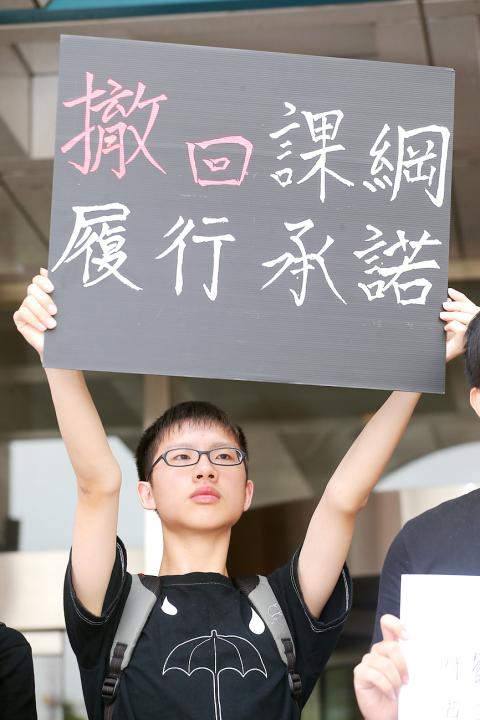Minister of education-designate Pan Wen-chung (潘文忠) should set a firm timeline for withdrawing controversial high-school curriculum guidelines, students said yesterday.
About 20 students protested in front of the Democratic Progressive Party’s (DPP) headquarters in Taipei, demanding that the DPP keep its promise to abolish the guidelines.
The allegedly China-centric focus and opaque approval process of last year’s “adjusted” guidelines sparked a student movement that saw the forecourt of the Ministry of Education compound in Taipei occupied by demonstrators.

Photo: George Tsorng, Taipei Times
“After winning the January elections, the DPP has only stated that it supports the students’ position. It has not promised to absolutely withdraw the guidelines after taking power on May 20,” Taipei Municipal Zhong-lun Senior High School student Lin Chih-yu (林致宇) said, adding that the DPP’s promises were in danger of becoming “feel-good” slogans.
Students said National Taiwan University social work professor Lin Wan-i (林萬億) — a top policy adviser to president-elect Tsai Ing-wen (蔡英文) — had promised them in December last year that the DPP would withdraw the guidelines should it win the elections.
Lin said he was concerned the DPP might backtrack after seeing it shift its position on the cross-strait trade in services agreement and related supervisory articles after January’s elections.

Photo: CNA
The DPP has drawn criticism for draft supervisory legislation that would exempt the trade in services agreement from new approval requirements, a key Sunflower movement demand.
Lin said premier-designate Lin Chuan’s (林全) comments that any decision on the guidelines would be up to Pan were another reason for concern, because Pan had been involved in their drafting in his previous role as administrative vice president of the National Academy for Educational Research.
Minister of Education Wu Se-hwa (吳思華) on Friday said Pan was personally responsible for overseeing the approval of the guidelines, which drew a sharp response from Pan, who said he was forced to relinquish oversight and withdraw from the process after having raised objections regarding procedures and the composition of the drafting committee.
“I was vice president of the National Academy for Educational Research at the time and I was supposed to oversee the development of curricula. However, I was relieved from the role because I was opposed to revisions of high-school curriculum guidelines, as the Ministry of Education did not make the revisions according to legal procedure and those who participated were not qualified to make the changes,” Pan said yesterday. “I was not involved in the process.”
Taiwan Grassroots Education Alliance member Chang Wen-lung (張文隆) said it was critical that Pan make his position clear, because teachers are in the process of choosing textbooks for the upcoming school year, with textbooks based on both the old and new guidelines available.
“If the minister-designate can make a clear statement that the guidelines will be abolished after May 20, it will be easy for teachers to choose,” he said. “As things stand, teachers are vacillating, because the government has not decided.”
In response, the DPP’s Department of Youth Affairs’ Huang Shou-ta (黃守達) said that withdrawing the controversial curriculum guidelines has always been the party’s official stance on the issue, adding that the DPP legislative caucus has proposed amendments to provide a legal framework for future changes to curriculum guidelines.
Last month, 65 DPP legislators proposed a motion demanding that the Executive Yuan and the ministry withdraw the adjustments to curriculum guidelines announced in February 2014.
“The proposal is now being negotiated between parties and could be voted on by Friday next week at the earliest,” he said.
The DPP caucus has also proposed amendments to the Senior High School Education Act (高級中等教育法) and the Primary and Junior High School Act (國民教育法) to make sure that curriculum guidelines will be decided in a professional manner, based on democratic principles and with the participation of the private sector, Huang said.
According to the proposed amendments, the ministry’s curriculum review committee is to be made a permanent organization instead of an ad hoc committee, with government representatives occupying less than one-fourth of seats on the committee, with the remainder filled by non-governmental representatives from educational institutions and groups recommended by the Legislative Yuan, Huang said.

Tropical Storm Gaemi strengthened into a typhoon at 2pm yesterday, and could make landfall in Yilan County tomorrow, the Central Weather Administration (CWA) said yesterday. The agency was scheduled to issue a sea warning at 11:30pm yesterday, and could issue a land warning later today. Gaemi was moving north-northwest at 4kph, carrying maximum sustained winds near its center of up to 118.8kph and gusts of 154.8kph. The circumference is forecast to reach eastern Taiwan tomorrow morning, with the center making landfall in Yilan County later that night before departing from the north coast, CWA weather forecaster Kuan Shin-ping (官欣平) said yesterday. Uncertainty remains and

SEA WARNING LIKELY: The storm, named Gaemi, could become a moderate typhoon on Wednesday or Thursday, with the Taipei City Government preparing for flooding A tropical depression east of the Philippines developed into a tropical storm named Gaemi at 2pm yesterday, and was moving toward eastern Taiwan, the Central Weather Administration (CWA) said. Gaemi could begin to affect Taiwan proper on Tuesday, lasting until Friday, and could develop into a moderate typhoon on Wednesday or Thursday, it said. A sea warning for Gaemi could be issued as early as Tuesday morning, it added. Gaemi, the third tropical storm in the Pacific Ocean this typhoon season, is projected to begin moving northwest today, and be closest to Taiwan on Wednesday or Thursday, the agency said. Today, there would likely

DISRUPTIONS: The high-speed rail is to operate as normal, while several airlines either canceled flights or announced early departures or late arrivals Schools and offices in 15 cities and counties are to be closed today due to Typhoon Gaemi, local governments announced last night. The 15 are: Taipei, New Taipei City, Taoyuan, Tainan, Keelung, Hsinchu and Kaohsiung, as well as Yilan, Hualien, Hsinchu, Miaoli, Chiayi, Pingtung, Penghu and Lienchiang counties. People should brace for torrential rainfall brought by the storm, with its center forecast to make landfall on the east coast between tonight and tomorrow morning, the Central Weather Administration (CWA) said. The agency issued a sea warning for the typhoon at 11:30pm on Monday, followed by a land warning at 11:30am yesterday. As of

CASUALTY: A 70-year-old woman was killed by a falling tree in Kaohsiung as the premier warned all government agencies to remain on high alert for the next 24 hours Schools and offices nationwide are to be closed for a second day today as Typhoon Gaemi crosses over the nation, bringing torrential rain and whipping winds. Gaemi was forecast to make landfall late last night. From Tuesday night, its outer band brought substantial rainfall and strong winds to the nation. As of 6:15pm last night, the typhoon’s center was 20km southeast of Hualien County, Central Weather Administration (CWA) data showed. It was moving at 19kph and had a radius of 250km. As of 3pm yesterday, one woman had died, while 58 people were injured, the Central Emergency Operation Center said. The 70-year-old